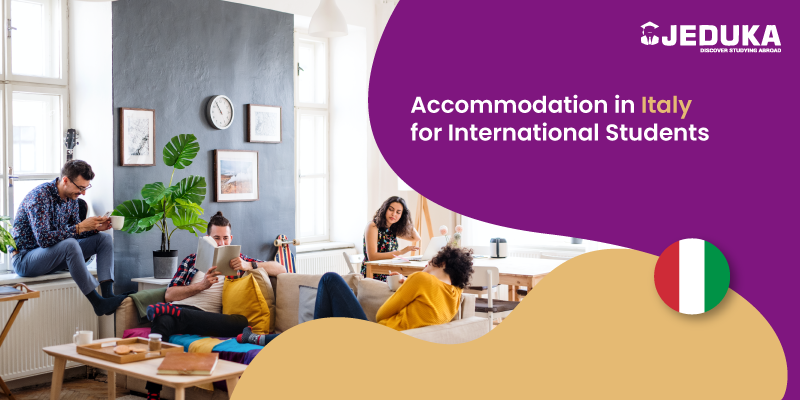Published Date: 10th March 2023
Italy is a popular destination for international students due to its rich culture, history, and vibrant lifestyle. The country is home to some of the world's oldest and most prestigious universities, including the University of Bologna, the University of Milan, and the University of Rome. If you're planning to study in Italy, you'll need to find accommodation that suits your needs and budget. In this blog post, we'll explore the various types of accommodation available to international students in Italy.

1. University Residence Halls
University residence halls, also known as "colleges" or "dormitories," are a popular choice for international students in Italy. These are usually owned and managed by the universities and are located on or near the campus. The residence halls offer a range of facilities, including shared or private bedrooms, bathrooms, kitchens, and laundry rooms. Some residence halls may also provide meals, cleaning services, and recreational facilities such as gyms and common rooms.
Living in a university residence hall can be an excellent way to meet other international students and make new friends. However, the availability of these rooms can be limited, and they are often allocated on a first-come, first-served basis. It's best to apply for a university residence hall as early as possible to increase your chances of securing a spot.
2. Private Apartments
Private apartments are another popular accommodation option for international students in Italy. These are rented from private landlords and can range from studio apartments to larger apartments with several bedrooms. Private apartments are usually more expensive than university residence halls, but they offer greater privacy and independence.
Before renting a private apartment, it's important to carefully read the rental contract and make sure you understand the terms and conditions. You may also need to pay a deposit (called "caparra" in Italian) before moving in, which will be returned to you at the end of the rental period if there is no damage to the apartment.
3. Homestays
Homestays are a great option for international students who want to experience Italian culture and improve their language skills. In a homestay, you live with a local Italian family who will provide you with a bedroom and meals. This can be an excellent way to immerse yourself in the Italian way of life and learn more about the country's customs and traditions.
Homestays can be arranged through various agencies or by contacting families directly. It's important to carefully consider the location and type of family you want to live with to ensure a comfortable and enjoyable experience. Homestays can also be more expensive than other accommodation options, and you may need to pay for additional expenses such as transportation and internet access.
4. Shared Apartments
Shared apartments, also known as "flat-sharing," are a popular option for international students who want to live with other students or young professionals. In a shared apartment, you have your bedroom but share common spaces such as the kitchen, living room, and bathroom with other tenants.
Shared apartments can be a more affordable option than private apartments, and they offer the opportunity to live with people from different countries and cultures. However, it's important to carefully select your roommates to ensure a harmonious living arrangement. You may also need to sign a rental contract and pay a deposit before moving in.
5. Temporary Accommodation
If you're unable to secure permanent accommodation before arriving in Italy, temporary accommodation can be a good solution. This includes hostels, hotels, and Airbnb rentals. Hostels and hotels can be expensive, but they offer the convenience of short-term accommodation until you find a more permanent solution.
6. Student Residences
In addition to university residence halls, there are also private student residences available for international students in Italy. These residences are typically owned and managed by private companies and offer a range of facilities such as shared or private bedrooms, bathrooms, kitchens, and common areas. Some student residences may also provide cleaning services, meals, and recreational facilities.
Living in a student residence can be a good option if you want to live in a community with other international students. However, the cost of student residences can be higher than other accommodation options, and availability may be limited.
7. Studio Apartments
Studio apartments are a type of private apartment that consists of a single room that serves as both a living area and a bedroom. They typically include a small kitchenette and a bathroom. Studio apartments are ideal for students who value privacy and independence and don't need a lot of space.
The cost of studio apartments can vary depending on their location and size, but they are generally more affordable than larger apartments. However, it's important to carefully read the rental contract and understand the terms and conditions before signing.

Cost of Accommodation
The cost of accommodation in Italy can vary depending on the location, type of accommodation, and level of comfort. Generally, accommodation in big cities such as Rome and Milan is more expensive than in smaller cities and towns.
University residence halls and student residences are often the most affordable options, but availability can be limited. Private apartments and shared apartments can be more expensive, but they offer greater privacy and independence. Homestay and temporary accommodation options can also be more expensive, but they offer unique cultural experiences.
When budgeting for accommodation, it's important to consider additional expenses such as utilities, internet, and transportation costs.
Tips for Finding Accommodation
Finding accommodation in Italy can be a daunting task, especially for international students who are unfamiliar with the country's housing market. Here are some tips to help you find suitable accommodation:
- Consider the location of your accommodation and its proximity to your university or Start your search early to increase your chances of finding available accommodation.
- Research different accommodation options and compare prices to find the best option for your budget and needs.
- Reach out to other international students or local housing organizations for advice and support.
- Read rental contracts carefully and ask questions if you don't understand something.
- public transportation.
- Be prepared to pay a deposit and provide references or proof of income
- Be open to different types of accommodation, such as shared apartments or homestays, to broaden your options.

In conclusion, finding suitable accommodation in Italy for international students requires careful research and planning. Whether you choose to live in a university residence hall, private apartment, homestay, or shared apartment, it's important to consider your budget and needs to ensure a comfortable and enjoyable living experience. By following these tips and being open to different options, you can find the perfect accommodation for your study abroad experience in Italy.

1. What types of accommodation are available for international students in Italy?
There are various types of accommodation available, such as university residences, private apartments, shared flats, and homestays. Each option has its pros and cons, so it's important to research and compares them before making a decision.
2. How much does accommodation cost for international students in Italy?
The cost of accommodation varies depending on the type of accommodation, location, and facilities. Generally, university residences and shared apartments are more affordable, while private rental accommodation is more expensive.
3. Is it advisable to book accommodation before arriving in Italy?
Yes, it is advisable to book accommodation before arriving in Italy, especially during peak seasons. Most universities and colleges have accommodation offices that can assist in finding suitable accommodation.
4. Are there any tips for finding affordable accommodation in Italy?
Yes, there are a few tips for finding affordable accommodation in Italy. Firstly, consider staying outside of popular tourist areas. Look for budget-friendly options such as hostels, campsites, or apartments on websites like Airbnb or Booking.com. Additionally, booking in advance and being flexible with your travel dates can often help you find better deals. Finally, consider traveling during the low season, which typically runs from November to March, when prices may be lower.
5. What facilities are usually provided in student accommodation in Italy?
Student accommodation in Italy typically comes with basic facilities such as a bed, study desk, chair, wardrobe, communal kitchen, and common room. Some accommodations may also have additional facilities such as a gym, laundry room, and recreational areas.
6. Do international students have to pay a deposit for their accommodation in Italy?
Yes, there are a few tips for finding affordable accommodation in Italy. Firstly, consider staying outside of popular tourist areas. Look for budget-friendly options such as hostels, campsites, or apartments on websites like Airbnb or Booking.com. Additionally, booking in advance and being flexible with your travel dates can often help you find better deals. Finally, consider traveling during the low season, which typically runs from November to March, when prices may be lower.
7. Can international students work part-time while studying in Italy to pay for accommodation?
Yes, international students can work part-time in Italy while studying. However, they should ensure that their visa permits them to work and that they are not exceeding the permitted hours.
8. Is it possible to change accommodation during the academic year in Italy?
Yes, it is possible to change accommodations during the academic year in Italy, but it can be challenging. Students should consult with their accommodation office for assistance.
9. Can international students bring guests to their accommodation in Italy?
This depends on the rules of the accommodation provider. In most cases, guests are allowed but with restrictions on the number of nights and the behavior of the guests.
10. What should international students do if they have problems with their accommodation in Italy?
International students should report any issues with their accommodation to the accommodation provider or the university/college accommodation office. If the issue is not resolved, they can seek assistance from student support services.
11. Can international students live with their families in Italy while studying?
Yes, it is possible for international students to live with their families in Italy while studying. They can choose to rent a private apartment or house that is suitable for families, or they can consider homestays.
Read Also
Do's and Don'ts for International Students in Italy
Requirements to Study in Italy as an International Student
Stay back and Work permit after Study in Italy









Categories: Italy
Tags: Study Abroad